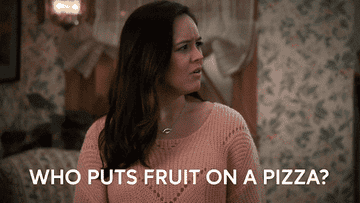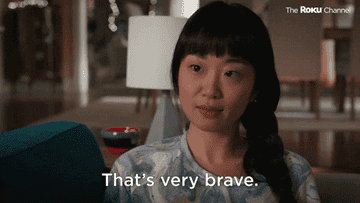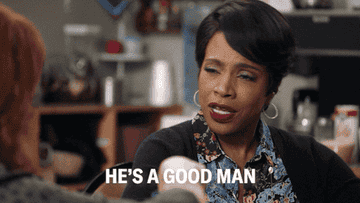"I Overcame It By Getting A Divorce": People Are Sharing The Cultural Differences They Had To Work Through With Their Partners From A Different Country, And Sometimes It's Harder Than You Think
Obviously, blending your life with someone else's already carries its own level of stress, but I can only imagine that blending your life with someone of an entirely different culture than your own needs a lot of care and work to succeed.

So, I asked the people of the BuzzFeed Community, if you've ever dated or married someone from a different country, what were the biggest cultural differences you had to work through, and how did you overcome them? And the experiences and advice did not disappoint:
1."My spouse and I constantly have to review our communication — that's our biggest cultural difference. English is his third language and my first, and you would not believe the cultural barrier it creates! So many words have different contexts for us that if we're not careful, we end up upset with one another and not even fully being able to explain why. It's usually funny once we explain to each other that the word choice was wrong. We now have a rule that if what's upsetting us is how something was said, we have to take the time to identify the word (or phrase) and explain its context as we understand it. Then, of course, we listen to the other person's explanation of its connotations."

"Politics can also be a major difference. I align much closer to his political stance in his country (socialism) than I do to my own, so we don't have any conflicts over that, but he's not afraid to discuss politics with my family, which can lead to some intense and frustrating conversations. We both stand by the phrase that 'family is chosen and blood doesn't necessarily equate to love,' so I stand by him and his thoughts. And like I said, I also agree with him."
—Anonymous
2."I'm British, and my husband is Swiss. We live in Switzerland, and I miss the friendliness of British life. But the biggest cultural difference was traveling by train on a Sunday evening. Don’t get me wrong; public transport is amazing here. All Swiss men have to do a year of military service, usually when they turn 18, and over the weekend they all go home."
"On Sunday evening they travel back to base, most by train, so the train station is filled with young guys in uniform, having a beer on the train with MASSIVE GUNS! Guns just propped up next to kit bags, guns balanced on seats, guns in the storage rack — just wild! They take them home for the weekend just in case."
3."My boyfriend is Italian, and food is sacred! No more chicken-based pasta (chicken with pasta apparently doesn't exist), microwave pasta meals are a giant no-no, and don't even get me started on how my favorite Hawaiian pizza is basically sacrilege."

4."I’m Australian, and my husband is Portuguese. I’ll never get used to the volume and intensity of everyday conversation. General chitchat in Portuguese can easily sound like a verbal attack to me. When he’s speaking passionately about something, it’s generally at a level most chilled Australians would consider alarming. I hope he never changes."
5."In college, I began dating a South Asian man. He was incredibly intelligent and very kind; he was also completely spoiled and not at all self-sufficient. He would drive over two hours home from university every weekend so his parents could do his laundry, wash his car, and cook him a bunch of food for the week. He would lie to his parents about the silliest things 'so they wouldn’t worry.' Things like, we went to a movie after dark, and he would say it was an afternoon show because they worried about him being out after dark. Mind you, he was a grown man at this point."

"Two years into our relationship, we were madly in love, but I felt like I always came second to his parents. I knew that in his culture, you essentially belong to your parents until the day you marry, but I wasn’t willing to wait until I was married to make sure I would be his first priority. I needed to know that before I would marry him. So we talked about it, and I made it clear how I felt and what I believed needed to change, and he completely overhauled his relationship with his parents. He stopped lying about ridiculous things, began asserting his independence, and learned how to look after not just himself but me as well. We became equals in our relationship after that, each of us prioritizing the other over anyone else and taking care of each other. We’ve been married almost 20 years now, and we are so fortunate to have close, loving relationships with both sets of parents."
—Anonymous
6."I'm from the US, but I married my husband, who is originally from Venezuela. I think the hardest part would have to be the language and cultural barriers. More recently, a lot more of his family moved to the US in the same area as us, and my husband is the only one of his family that speaks English fluently, besides two of his cousins that moved here that also speak English."
"Having get-togethers with his family has been hard for me because his family is all mingling together, speaking in Spanish, while I know only a couple words in Spanish, so I feel left out most of the time. There's only so much conversation you can have with each family member in broken English or Spanish. I am trying my best to learn more Spanish, but it's difficult for me. Another interesting tradition for them is that they celebrate Christmas on Christmas Eve by hosting a giant dinner and then staying up all night drinking until, like, 4 a.m. Definitely not what I am used to when celebrating Christmas."
7."He is American; I’m not. The biggest difference was his loud, obnoxious patriotism. I’m all for being proud of your country, but this was on a whole other level. He put up an American flag in our garden, even though it absolutely wasn’t a ‘thing’ in my country. He loudly pointed out the shortfalls of his ‘host’ country for all to hear and took every opportunity to say how the USA was the greatest."

"There were a few times I thought someone was going to smack him, and looking back, I should have let them. When I moved to the US, he eroded my culture completely. My children weren’t even allowed to call me by the name given to mothers in my country. He literally stamped out any visible trace of my culture, despite showing me off like a freaking doll for supply, admiration, and to boost his cripplingly low self-esteem. We are divorced now."
—Anonymous
8."I am Canadian, and my husband is from North Africa. When he first came to Canada, he could not understand why our food was so bland. He came to the realization that we get flavor from sauces, and they get flavor from spices. Needless to say, I had to 'up' my cooking skills, and now I have a pantry full of spices. I’m happy, though... Harissa has been a game changer!"
—Anonymous
9."I’m from the US, but my husband is originally from China (he moved to the US when he was 9). The biggest cultural differences are mostly with his family. I have a huge language barrier, and there are differences in the foods we eat with his extended family. I was always raised to eat whatever was offered to me, but I also have a really hard time with meat lately (even just steak), as something about the textures makes me nauseous."

"Mostly when we visit them, I just sit there politely while they converse in Cantonese and occasionally answer questions, and I’m working on finding a way to learn the language, but it’s a VERY difficult one to learn and will take a long time. As far as the food goes, I do my best to try everything that I can, but that might be the hardest part of growing up in different cultures. Their cuisine is very different than basic American cuisine."
10."I was a year into my relationship with a woman from China, and we were discussing marriage. She began to tell me about the various traditions around marriage, and the biggest sticking point was the Caili (彩礼). This gets translated as betrothal gift or bride price, and it was a hefty sum of cash to be given to her parents upon engagement."
"I balked at this because it seemed like paying for a wife. We argued over this regularly until finally, after a year and a half, she gave me all the details of how it actually works in her particular area. The Caili is given as a demonstration of the ability to support the daughter, and later, when another big change comes to the couple, the family returns the money (like when the first child is born). Once I had those details, I became more comfortable with the concept. Ultimately, my advice would be to ask for a thorough explanation of the difference you're stuck on and try to understand the purpose of the cultural practice. America is in many ways a less traditional country, and we don't examine our own traditions but get really hung up on those of others."
—Anonymous
11."I'm Mexican and married to a Black woman. It was definitely a struggle in the beginning of our relationship because of the different ways we were both raised and also because Mexican parents (particularly mothers) insist on being very involved in their adult children’s lives and vice versa. It took a lot of redefining the relationship with my family of origin. And not just because of my relationship with my then-girlfriend/now-wife."

"But I have learned so much about Black culture and have really learned to love and appreciate it in a special way, and I also get to share my Mexican culture with my wife. And just overall, being in an interracial marriage also just solidified my ability to really form relationships and bonds with people of other cultures and learn to really appreciate their cultures and empathize with their unique struggles."
12."I am Canadian, and my spouse is British. At first I didn’t think there were many cultural differences between us, but as the years go on, I really see the prevalence of the whole stiff upper lip thing, class barriers, and a habit of indirect communication."
"We don’t have this issue with each other because we are now so used to communicating effectively, but I’ve actually needed to do therapy to better understand how my in-laws communicate because family fights have started completely without my realizing it simply because so much goes unsaid or is unable to be said. This obviously doesn’t apply to every British family, and I’m really happy my spouse is not like this, but it’s a massive struggle for me because I grew up in such a direct environment where everything could be on the table without it being seen as personal."
—Anonymous
13."I'm German, and I had an English boyfriend for three years. Even though it's geographically quite close, it was more of a culture shock than I thought. Way more smalltalk and chitchat; I was positively surprised by the food; driving on the left was weird for me; and just so, so many pubs."

14."In the early 1980s, my mom’s (white Canadian) job was acclimating the newly arrived Vietnamese people into Canadian life. This included getting them language training, finding them housing, finding them jobs, and helping with immigration issues. My mother met her second husband that way, and that is how my stepfather came into my life when I was nine years old. Let’s just say that growing up as a mouthy Canadian girl in a half Vietnamese household was difficult... and interesting. At one point, we were living with his parents, two brothers, one sister, myself, and my mom in one house."
"There was ALWAYS cultural friction in the household, but over the years, I thought that we had worked through that. But 40+ years later, he and I had a HUGE fight recently about what he perceives as my responsibilities as their child in their old age. They are all based on his culture and not Canadian culture, where we live. It has caused a huge rift between us and within the family, and my mother is heartbroken. We’re getting together in a few weeks for a family event, and I hope that we can make it through it without fighting with each other. I have been blessed with an upbringing that has allowed me to experience and appreciate everything about Vietnamese culture. However, I cannot be judged by their cultural standards as I am not Vietnamese! There is so much more conflict that this cultural clash has caused that I could write a book! This is just one tough family cross-cultural issue!"
15."I am a bi-racial (black/white) American female from New York, married to a Ugandan male, and we met in West Africa. The biggest challenges for me were the traditional Ugandan roles and duties expected of me, even though we lived in NYC together. When we traveled to his hometown, I saw what those expectations were firsthand and realized that was not something I could conform to. I overcame this by getting a divorce :)."

"We are now each happily married to our own spouses from our own respective cultures. It was a starter marriage, and we both learned what we needed and wanted from our partners and now have our own lives. Out of our short marriage came the most amazing daughter we could have ever imagined. So I wouldn't change that for the world. And she sees firsthand how different our lives are and is able to value them both for their unique contributions to her own identity."
—Anonymous
16."My partner is from France and I'm British-American with Italian grandparents, and I grew up influenced by those cultures, respectively, so we have quite a lot in common. But one thing that flabbergasted him was how quickly Americans introduce their significant others to their parents."
"He comes from a very traditional French family where introducing your boyfriend to your family is akin to a marriage proposal, so he was very surprised by how chill my family was about hosting him for Christmas after we'd been together for one year. Two years on, he's gotten used to it, but he still refers to my mom as his mother-in-law!"
—Anonymous
17."I’m Mexican, and I've lived in the US for pretty much all my life, and I am now currently dating a Croatian man. While we share most values, he seems to be moving pretty fast, and apparently that’s completely normal in his culture. After dating for two months, he said it was a great idea to move in together. I was not raised like that, so I told him I was not comfortable and I wanted to enjoy the dating part more before anything serious like that. He understood, and it’s been great since, but early on he constantly spoke about how his mom and dad got married after the second date."

—Anonymous
18."I am a white American and married a Colombian man who moved to the US as an adult. We are both bilingual, so language has not been a barrier. However, our ideas about how much time to spend with family versus friends are a little different."
"He feels that free time should be spent mostly with family, whereas I feel it is healthy to spend time occasionally with friends away from family. That balance can be difficult. Also, he is way more comfortable with physical affection in public than I was when we met. I have come to appreciate it!"
—Anonymous
And finally, because of this woman and her husband's cultural differences, she was able to teach him one of the most important lessons of all time:
19."I'm a Korean woman who married a Mexican-American man. Wearing shoes in the house has been one of our biggest cultural differences! I made a special area by our front door for easy shoe removal, but this man still sometimes wears shoes in the house, and it drives me wild! We still deal with it sometimes when he 'forgets,' but I gently just look down at his feet, and he cleans the path that he walked."

—Anonymous
Did you relate to any of these, or do you want to tell your own story about overcoming cultural differences in your relationship? Let me know in the comments!
Note: Submissions have been edited for length and/or clarity.

